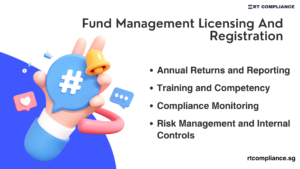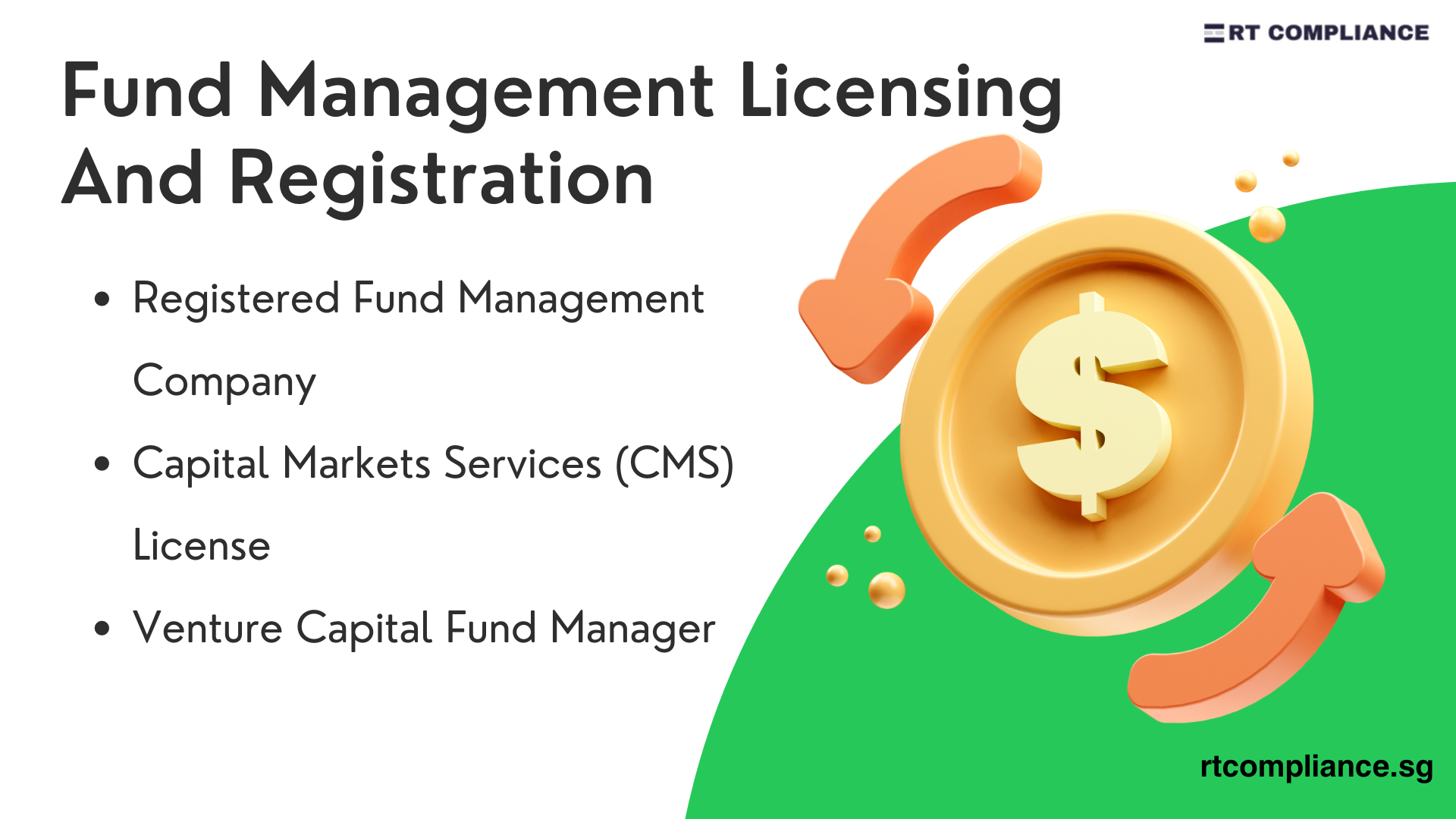When it comes to investing in Singapore, there are somethings you need to know about fund management licensing and registration. In this blog article , we will explore the requirements for both of these things so that you can be prepared when investing. First, let’s look at fund management licensing. To be a licensed fund manager in Singapore, you must have at least $1 million in assets under management (AUM). You will also need at least three years of experience managing investments, and you must pass a proper test administered by the Monetary Authority of Singapore (MAS). As for registration, you will need to register with the MAS if you plan to manage a fund that is open to retail investors. This includes both public and private funds. You will need to register for public funds as a registered fund management company. You will need to register as a registered investment advisor for private funds. So, there you have it! These are the requirements for both fund management licensing and registration in Singapore. Be sure to meet these requirements before investing legally and safely.
What is Fund Management Licensing and Registration (RMFC) in Singapore?
To manage a fund in Singapore, you must first obtain a fund management license in Singapore from the Monetary Authority of Singapore (MAS). This is commonly referred to as the Singapore fund management license and allows you to legally operate a fund under Singapore’s regulations. Understanding the fund management registration process in Singapore is essential for compliance and business legitimacy.
what is str To obtain a fund management license, you must first meet specific eligibility criteria set out by the MAS. Once you have met these criteria, you must submit an application to the MAS for approval.
The process of obtaining a fund management license can be pretty complex, so it is advisable to seek professional help when applying.
Once granted a fund management license, you must register your fund with the Registry of Moneylenders and Financial Advisers (RMFA). This registration is necessary for your fund to be marketed and sold in Singapore.
The RMFA is responsible for regulating all financial advisers and moneylenders in Singapore. As such, they will require that your fund meets specific standards before it can be registered.
After your fund has been registered with the RMFA, you can start marketing and selling it in Singapore. However, you will still need to comply with all of the MAS’s rules and regulations.
Understanding Ongoing Compliance for Licensed Fund Managers in Singapore
Once registered, licensed fund managers in Singapore are required to maintain ongoing compliance with the regulations set by the Monetary Authority of Singapore (MAS). Key aspects of ongoing compliance include:
- Reporting Obligations
Fund managers must regularly submit reports to MAS, including financial statements, audit reports, and operational updates. These documents help MAS monitor the financial health of the firm and ensure compliance with regulatory standards. - Risk Management
Fund managers are required to implement robust risk management systems to monitor market, liquidity, and operational risks. Regular risk assessments and stress testing must be conducted to ensure the fund remains within acceptable risk parameters. - Anti-Money Laundering (AML) and Countering the Financing of Terrorism (CFT)
Fund managers must maintain AML/CFT policies, including Know Your Customer (KYC) procedures and transaction monitoring. They must report suspicious activities to MAS and comply with international sanctions and regulatory requirements. - Staff Training and Competence
It is crucial for fund managers to ensure that their staff members are regularly trained in compliance-related matters. This includes ensuring that key personnel remain fit and proper under MAS guidelines, with relevant qualifications and experience. - Audits and Inspections
MAS may conduct periodic audits and inspections of fund managers to verify that they are adhering to regulatory standards. Fund managers must cooperate fully with MAS during these inspections and implement corrective actions when necessary.
Key Regulatory Obligations for Fund Managers Operating in Singapore
Fund managers in Singapore are subject to several key regulatory obligations designed to ensure transparency, investor protection, and financial stability. These include:
1. Licensing under the Securities and Futures Act (SFA)
Fund managers must hold an appropriate Capital Markets Services (CMS) license, which authorizes them to conduct activities such as managing investment funds, advising clients on securities, or operating a fund. Other licenses, such as the Exempt Fund Manager (EFM) or Registered Fund Management Company (RFMC), apply to smaller funds or those with a limited number of clients.
2. Conduct of Business Rules
Fund managers are required to comply with strict conduct of business rules, ensuring fair treatment of investors. This includes providing clear and accurate information about the fund’s performance, risks, and costs, as well as adhering to best practices in asset management.
3. Investor Protection
MAS places significant emphasis on investor protection, requiring fund managers to operate with transparency and accountability. This includes maintaining proper disclosure, handling conflicts of interest, and ensuring that investment strategies align with investors’ objectives.
4. Financial Reporting and Disclosure
Fund managers must adhere to stringent reporting requirements, including the submission of financial statements, annual audit reports, and disclosures on the fund’s portfolio performance. These reports must be accurate, timely, and in compliance with Singapore Financial Reporting Standards (SFRS).
5. Capital Adequacy and Risk Management
Fund managers must maintain adequate capital reserves and implement robust risk management policies. This includes ensuring liquidity, managing market risks, and conducting regular stress tests to gauge the fund’s exposure to different types of financial risks.
6. Anti-Money Laundering (AML) and Counter-Terrorism Financing (CFT)
Fund managers must establish comprehensive AML/CFT frameworks to prevent financial crime. This includes conducting customer due diligence, monitoring transactions, and reporting suspicious activities to the authorities in accordance with Singapore’s Corruption, Drug Trafficking and Other Serious Crimes (Confiscation of Benefits) Act.
By adhering to these key regulatory obligations, fund managers can maintain operational integrity and ensure compliance with the standards set by MAS, safeguarding investor interests and maintaining Singapore’s reputation as a leading global financial hub.
Crucial requirements for RFCs
Several requirements must be met to obtain a license for a fund management company (RFMC) in Singapore. First and foremost, the company must have at least $50 million in assets under management (AUM). Additionally, the company must have five years of experience managing investment funds and be registered with the Monetary Authority of Singapore (MAS).
The company must also have a sound investment philosophy and process and a track record of consistent performance. In addition, the company must have a robust compliance program and a commitment to high ethical standards. Lastly, the company should understand the Singapore regulatory environment well.
Different types of fund management licenses in Singapore
Singapore has three fund management licenses: the Full Fund Management License, the Investment Adviser License, and the Excluded Person’s Scheme.
The Full Fund Management License is the most comprehensive, allowing a company to conduct all aspects of fund management, from investment advisory to portfolio management.
The Investment Adviser License is more limited in scope and only allows a company to provide investment advisory services.
The Excluded Person’s Scheme is for individuals who are not employed by a licensed fund manager but still want to provide advice on investing in Collective Investment Schemes.
Fund Management Registration Process in Singapore: Step-by-Step Guide
To be a fund manager in Singapore, you must first be registered with the Monetary Authority of Singapore (MAS). The registration process is as follows:
1. Complete and submit the online application form for Singapore fund management registration.
2. Download, complete, and submit the required supporting documents, including those for the Capital Markets Services (CMS) license Singapore fund management.
3. Pay the registration fee (note: you can check the cost of fund management license in Singapore on the MAS website).
4. Receive and activate your MAS Registration Number (MRN).
5. Complete relevant modules such as compliance course Singapore and any ongoing compliance for licensed fund managers in Singapore.
6. Ensure you meet the full fund management license Singapore requirements.
After you have completed these steps, you will be officially registered as a fund manager in Singapore!
Critical considerations for fund managers in Singapore
Regarding funding management in Singapore, there are a few key considerations that all fund managers should be aware of.
First and foremost, all fund managers must obtain a license provided from the Monetary Authority of Singapore (MAS). Without a valid license, fund managers cannot operate legally in Singapore.
All fund managers must register with the Accounting and Corporate Regulatory Authority (ACRA). This is necessary to maintain good corporate governance and compliance with regulatory requirements.
Thirdly, fund managers should carefully consider the type of structure they want to set up for their business. The most common structures used by fund managers in Singapore are limited partnerships and trusts. Each has its advantages and disadvantages, so choosing the right and coorect one for your specific needs is essential.
Fourthly, you will need to have a robust investment strategy to succeed in Singapore. This means having a clear understanding of the market and being able to identify opportunities that offer growth potential.
Finally, it would help if you not forgot that the Singapore market is highly competitive. As such, you must ensure that your fund management company can stand out to attract and retain investors.






